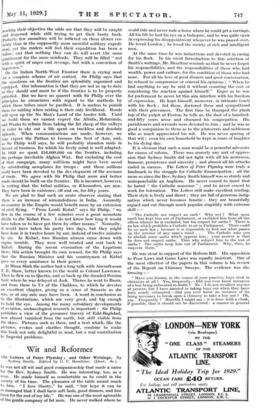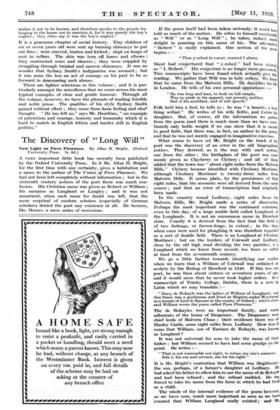Wit and Reformer The Letters of Peter Plyntley ; and
Other Writings. By Sydney Smith. Edited by G. C. Heseltine. (Dent. Os.).
IT was not all wit and good companionship that made a name for the Rev. Sydney Smith. He was interesting, too, as a man. He made himself as comfortable as he could in the society of his time. The pleasures of the table meant much to him. " I love liberty," he said, " but hope it can be
so managed that I shall have soft beds, good dinners, and fine linen for the rest of my life." He was one of the most agreeable of the gentle company of fat men. He never walked where he
could ride and never rode a horse where he could get a carriage. All his life he had his eye on a bishopric, and he was quite open in expressing his disappointment whenever he was passed over.
He loved London ; he loved the society of rich and intelligent men.
At the same time he was industrious and devoted in caring for his flock. In his vivid Introduction to this selection of Smith's writings, Mr. Heseltine reminds us that he never forgot his responsibilities, and the responsibilities of those who had wealth, power and culture, for the condition of those who had none. For all his love of good dinners and good conversation, he refused to compromise or conceal his opinions : " When he had anything to say he said it without counting the cost or considering the reaction against himself." Eager as he was for preferment he never let this aim interfere with his freedom of expression. He kept himself, moreover, in intimate touch with his flock ; fed them, doctored them and sympathized with their grievances. The first time he thumped the plush top of the pulpit at Foston, he tells us, the dust of a hundred- and-fifty years arose and obscured his congregation. His parishioners and servants were devoted to him ; and he was as good a companion to them as to the plutocrats and noblemen who so much appreciated his wit. He was never sparing of that wit ; even his own household he kept in roars of laughter to his dying day.
It is obvious that such a man would be a powerful advocate for causes of reform. There was scarcely any sort of oppres- sion that Sydney Smith did not fight with all his acuteness, humour, persistence and sincerity ; and almost all his attacks ended in success. The Letters of Peter Plymiey were truly a landmark in the struggle for Catholic Emancipation ; all the more so since the Rev. Sydney Smith himself was so sturdy and unimpeachable an Anglican. He never ceased to insist that he hated " the Catholic nonsense " ; and he never ceased to work for toleration. The Letters still make excellent reading. Their style is lively and direct ; they are full of generous indig- nation which never becomes fanatic ; they are beautifully argued and cut through much popular stupidity with extreme skill :- " The Catholic not respect an oath ! Why not ? What upon earth has kept him out of Parliament, or excluded him from all the offices whence he is excluded, but his respect for oaths ? There is no law which prohibits a Catholic to sit in Parliament. There could be no such law ; because it is impossible to find out what passes in the interior of any makes mind . . . The Catholic asks you to abolish some oaths which oppress him ; your answer is that he does not respect oaths. Then why subject him to the test of oaths ? The oaths keep him out of Parliament. Why, then, ho respects them."
He was stout in support of the Reform Bill. His opposition to Poor Laws and Game Laws was equally insistent. One of the most effective of the papers in this volume is his review of the Report on Chimney Sweeps. The evidence was dis- tressing :—
" Have you known, in the course of your practice, boys stick in chimneys at all ? Yes, frequently.—Did you ever know instances of a boy being suffocated to death ?. No ; I do not recollect anyone at present, but I have assisted in taking boys out when they have been nearly exhausted.—Did you ever know an instance of its being necessary to break open a chimney to take a boy out ? Oh, yes. Frequently ? Monthly I might say : it is done with a cloak, if possible, that it should not be discovered : a master in general wishes it not to be known, and therefore speaks to the people be- longing to the house not to mention it, for it was merely the boy's neglect ; they often say it was the boy's neglect."
It is a gruesome chapter of social history. Tiny children of six or seven years old were sent up burning chimneys to put out fires ; were starved, beaten and kicked ; slept on heaps of soot in cellars. The skin was torn_ off knees and elbows they contracted sores and efincers ; they were crippled by struggling through twisted and narrow chimneys. Jt was no wonder that Sydney Smith's indignation was aroused ; but it was none the less an act of courage on his part to be so forward in denonneing such abuses.
There are lighter selections in this volume ; and it is par- ticularly amongst the miscellanea that we come across his most typical examples of clear and gentle humour. Through all the volume, however, we have the pleasure of reading forcible and noble prose. The qualities of his style Sydney Smith gained without effort ; they come from keen feeling and elea.r thought. " He has left us," says Mr. Heseltine, " an example of patriotism and courage, honesty and humanity which it is hard to match in English letters and harder still in English politics."











































 Previous page
Previous page